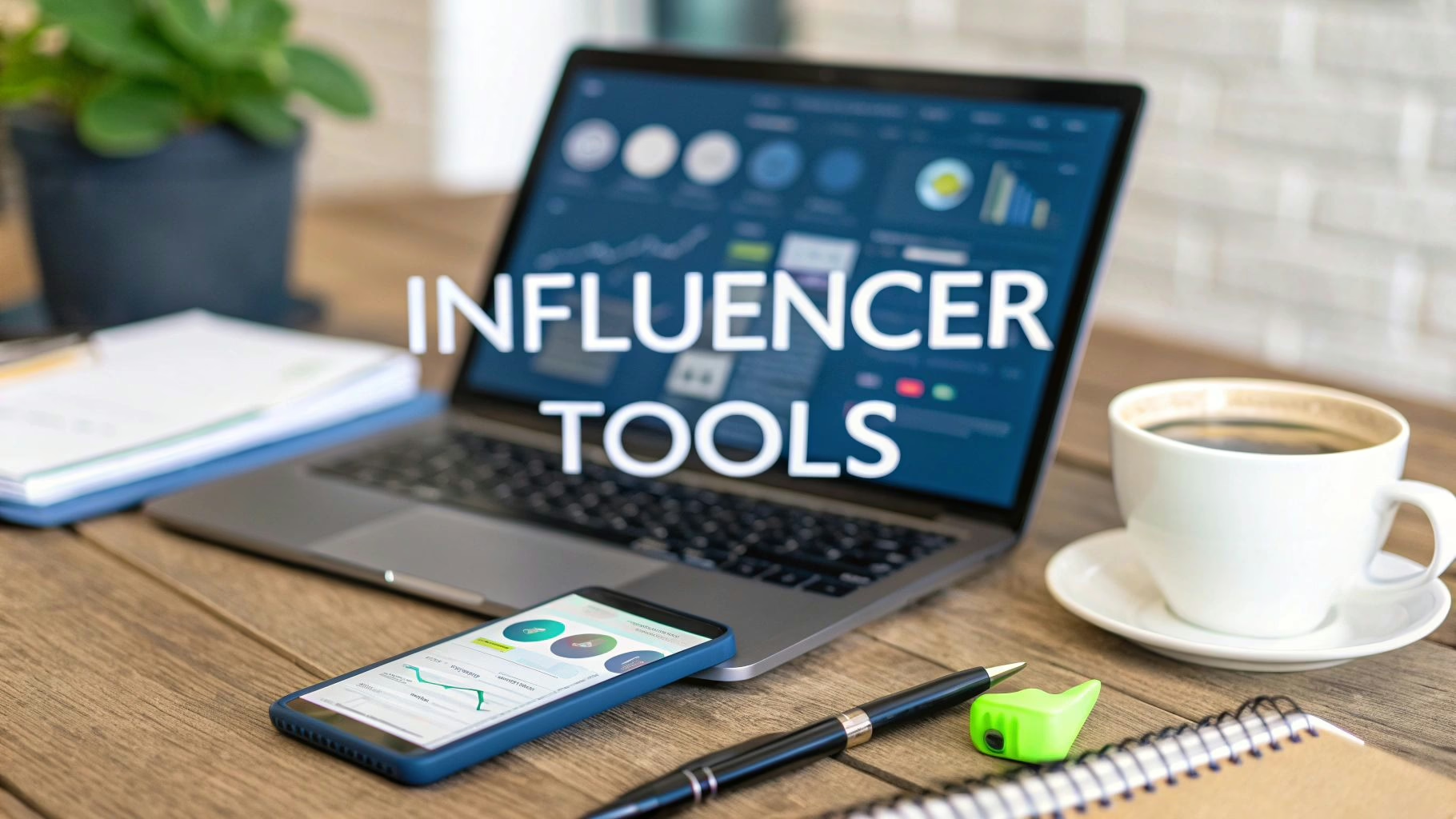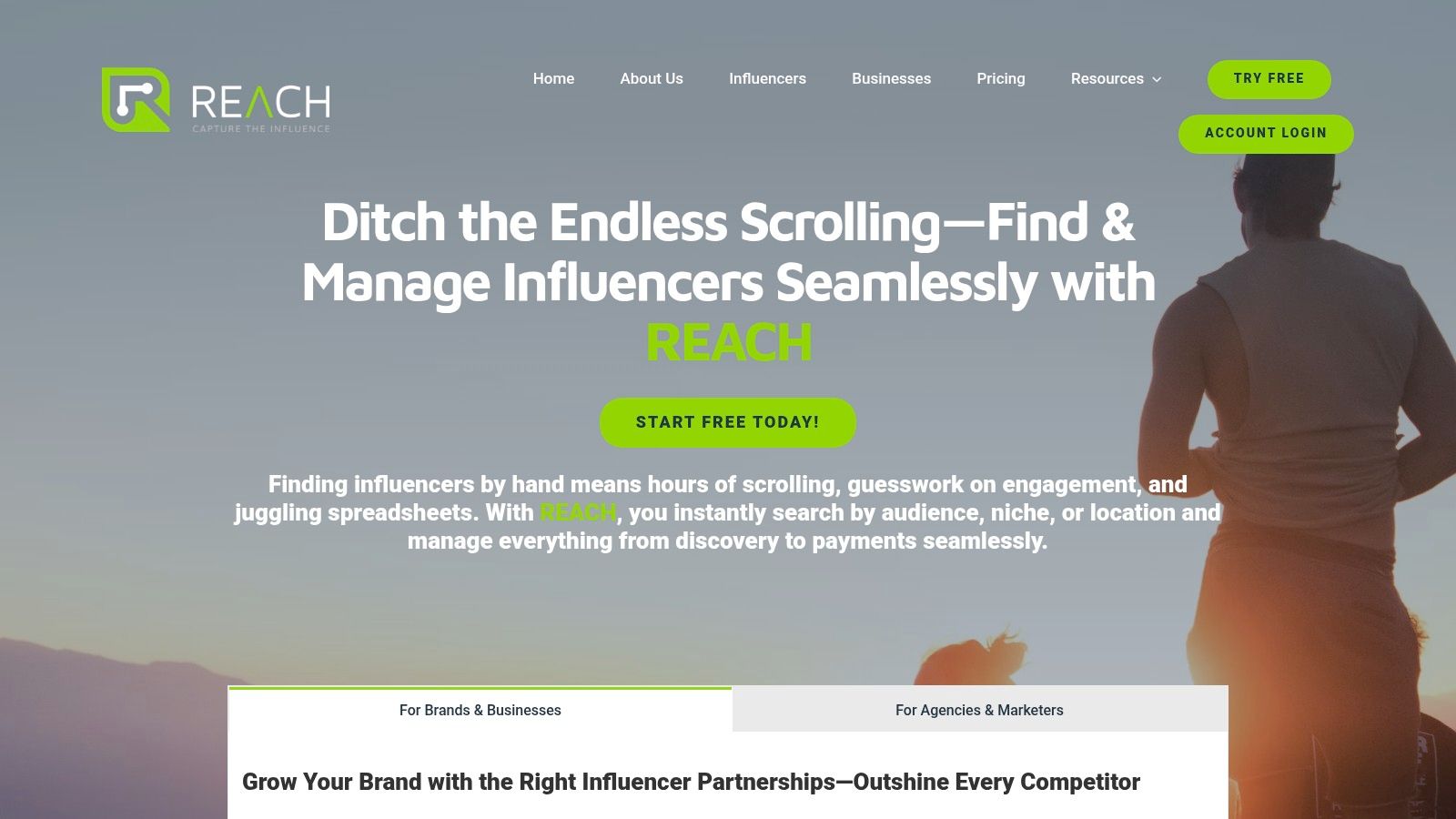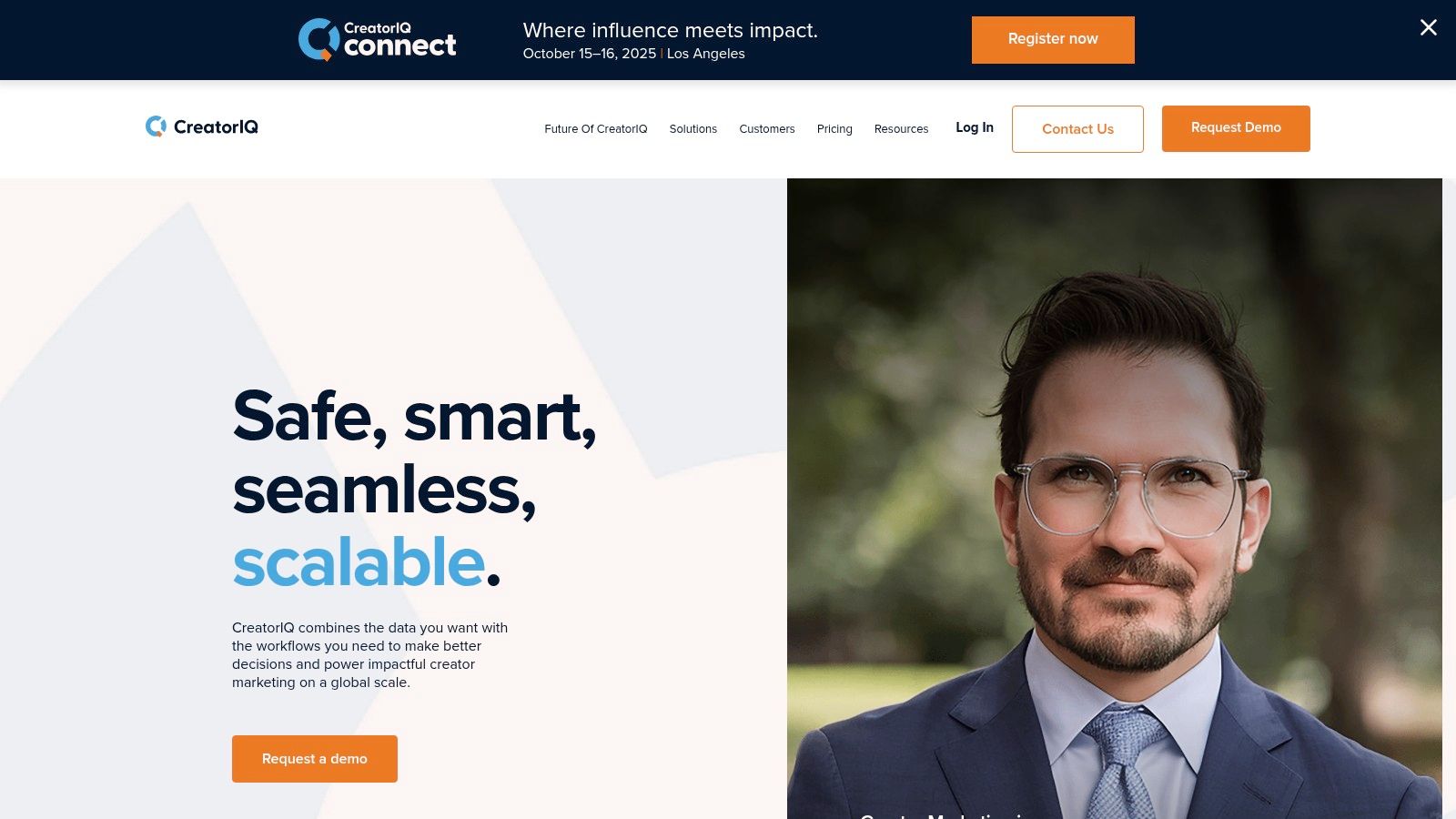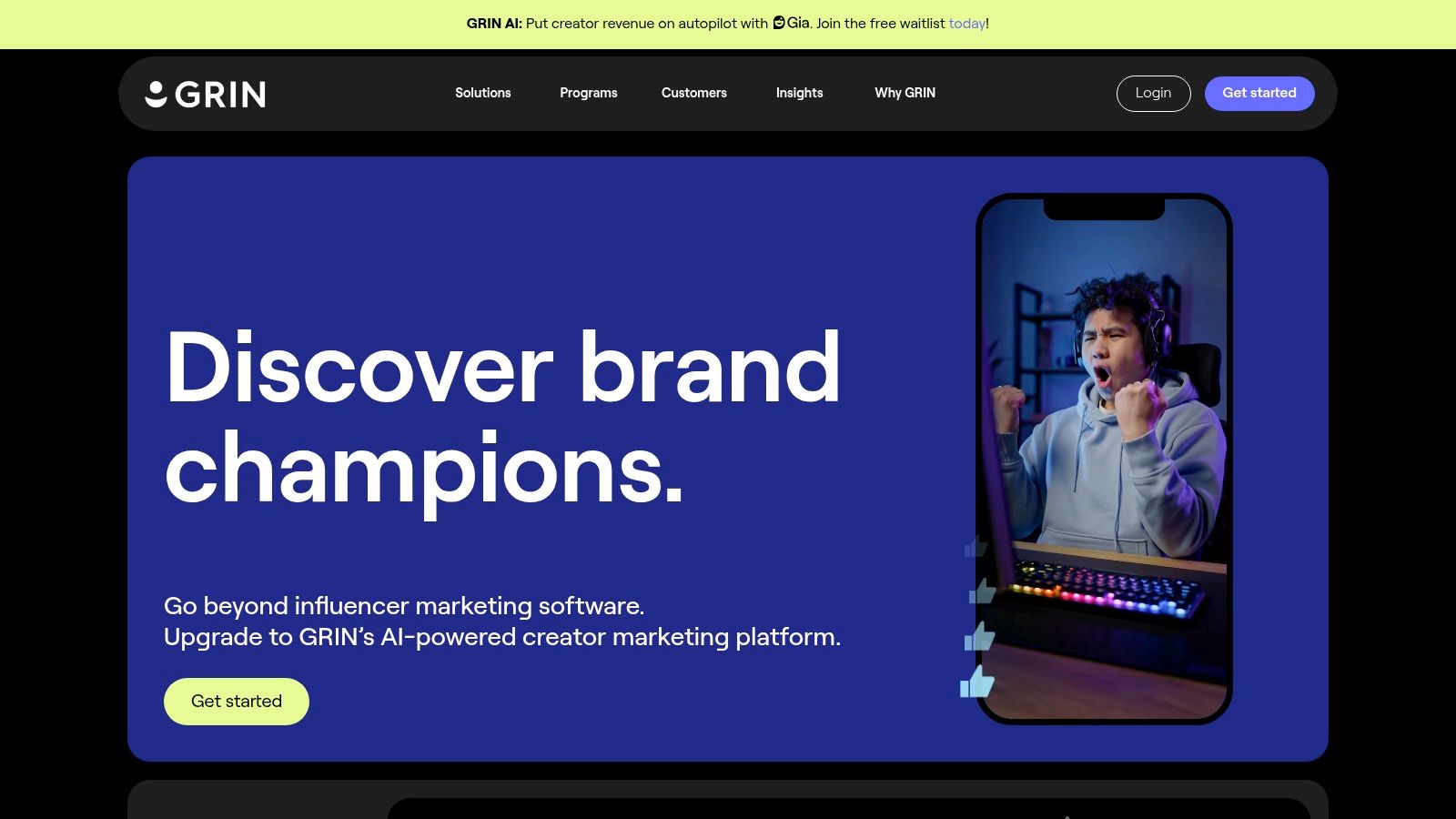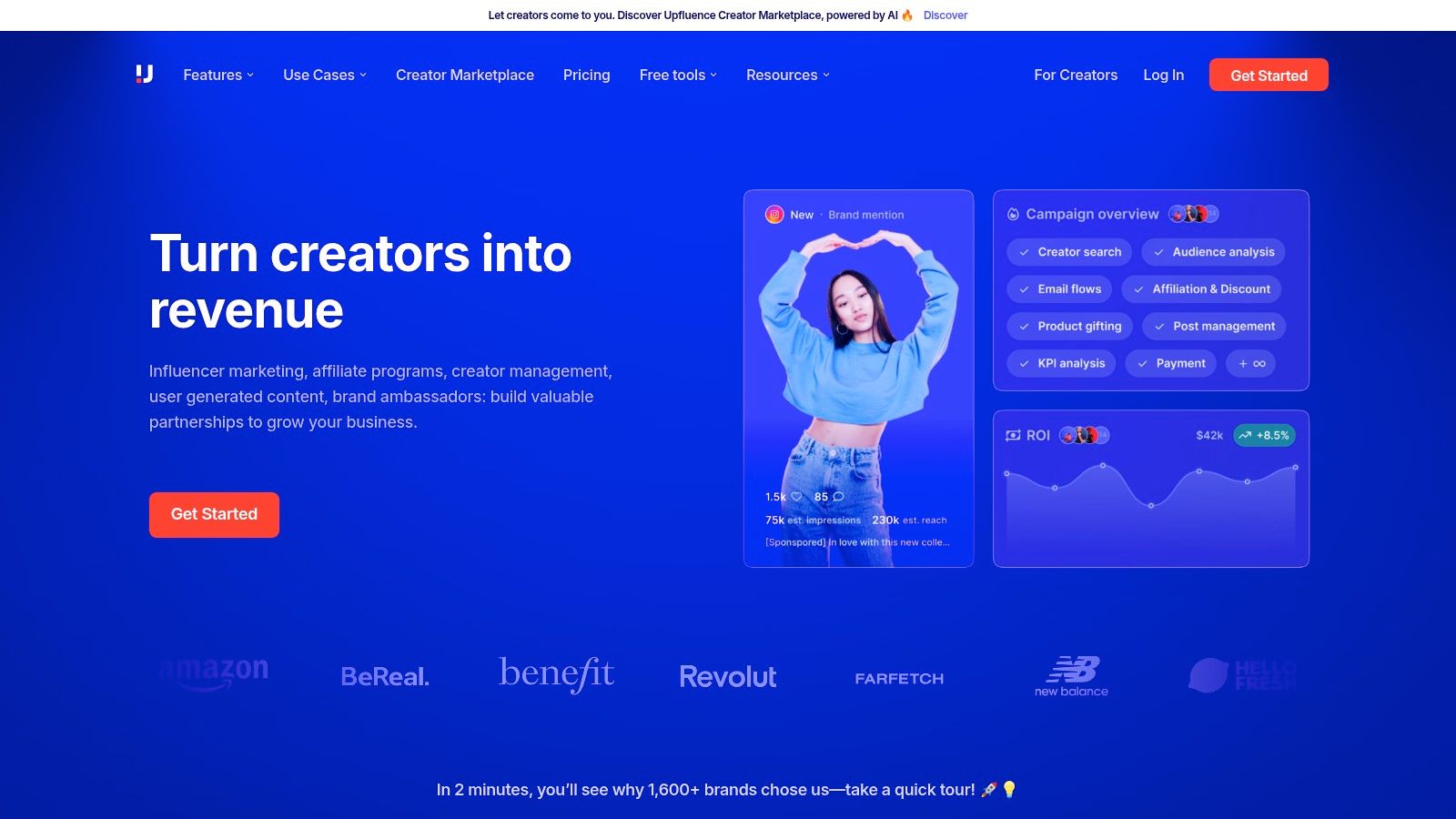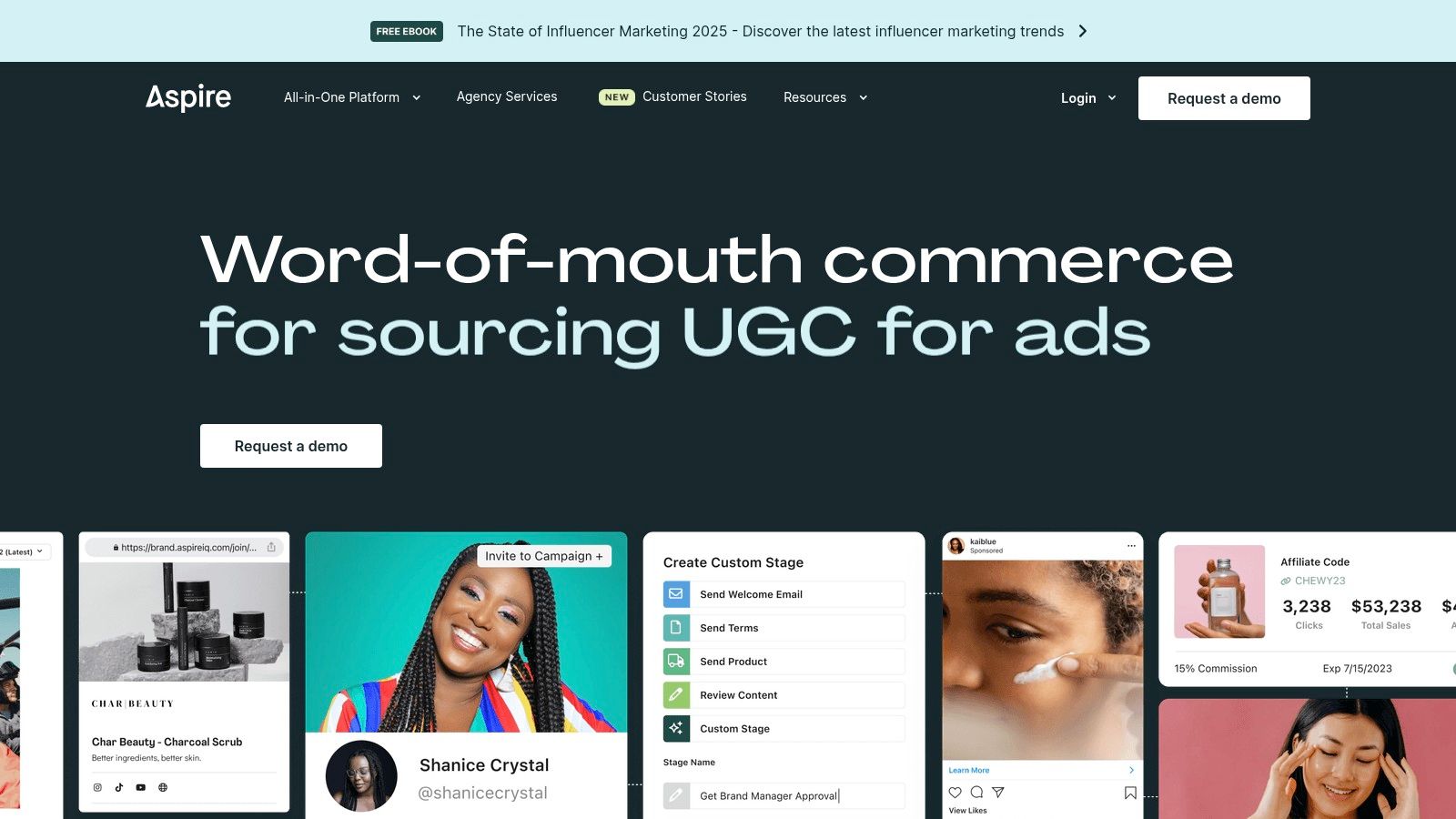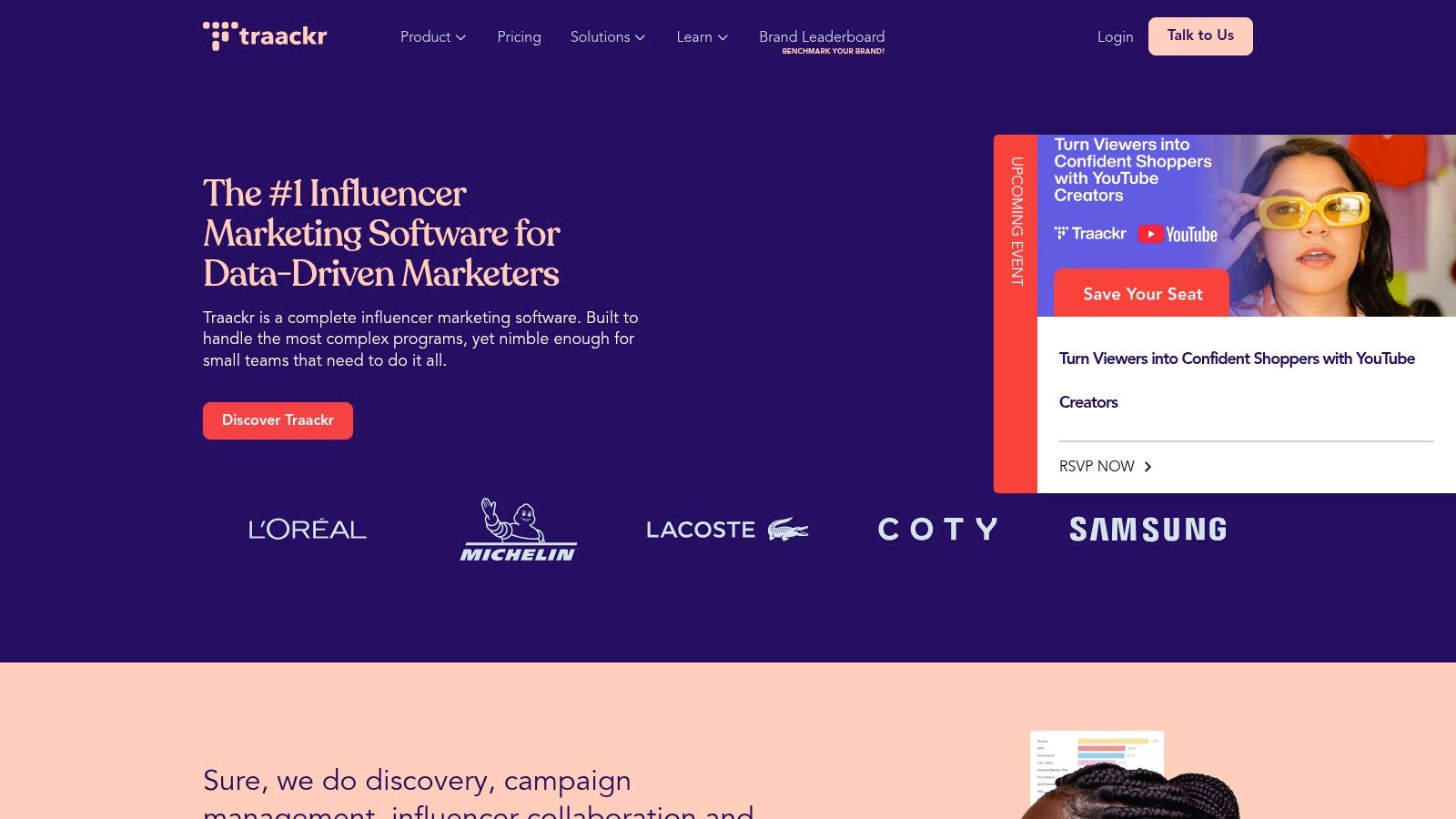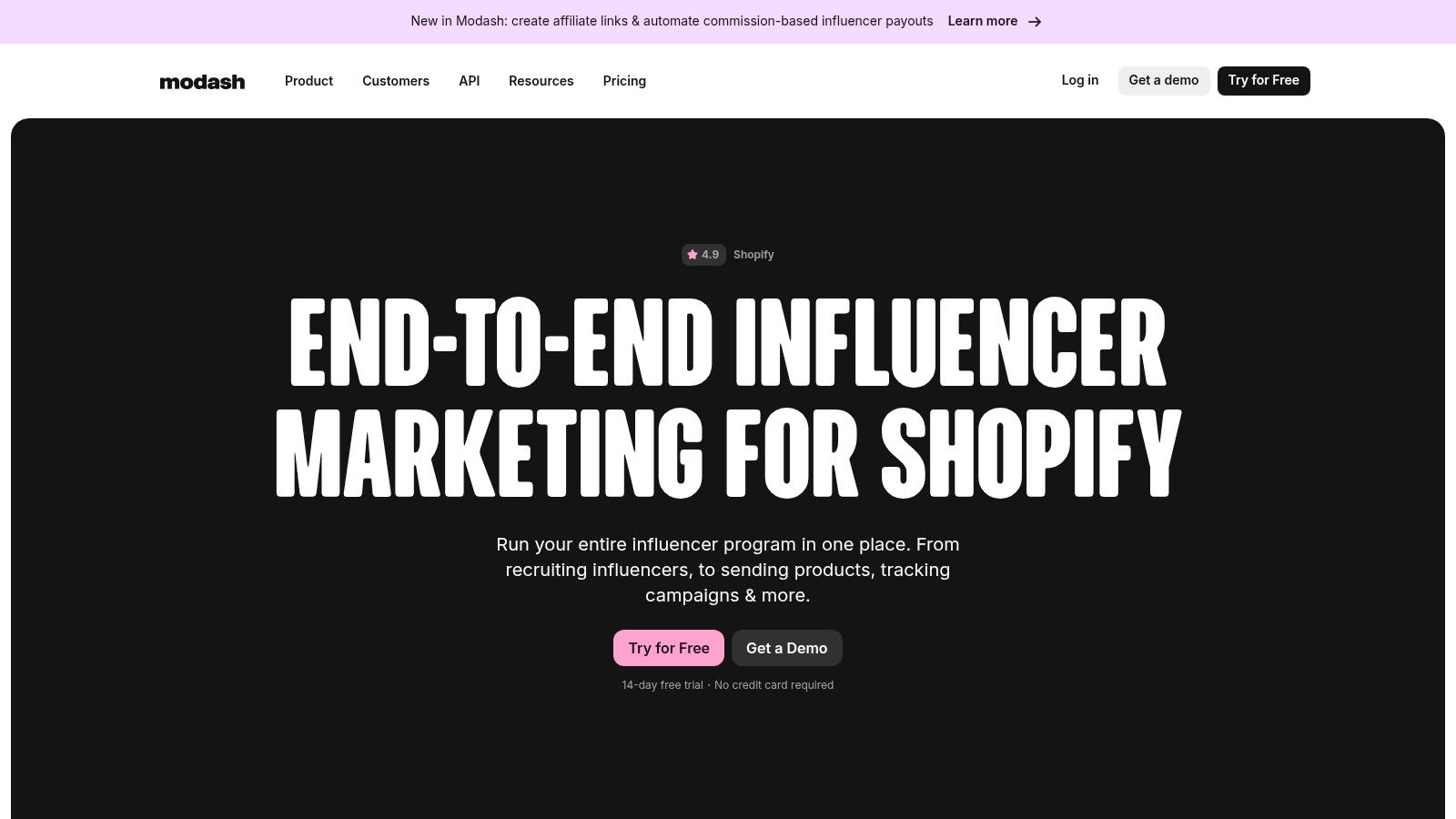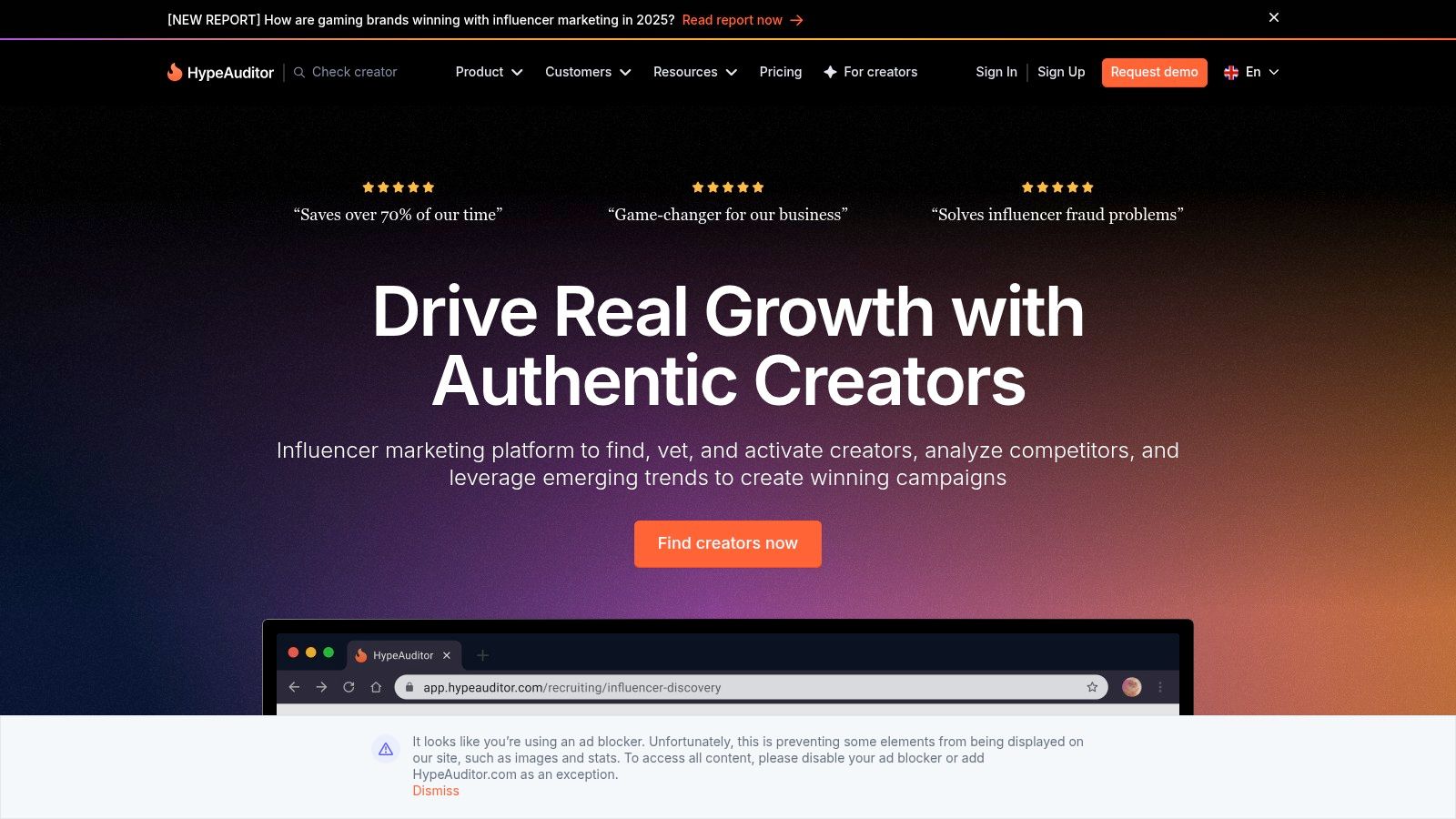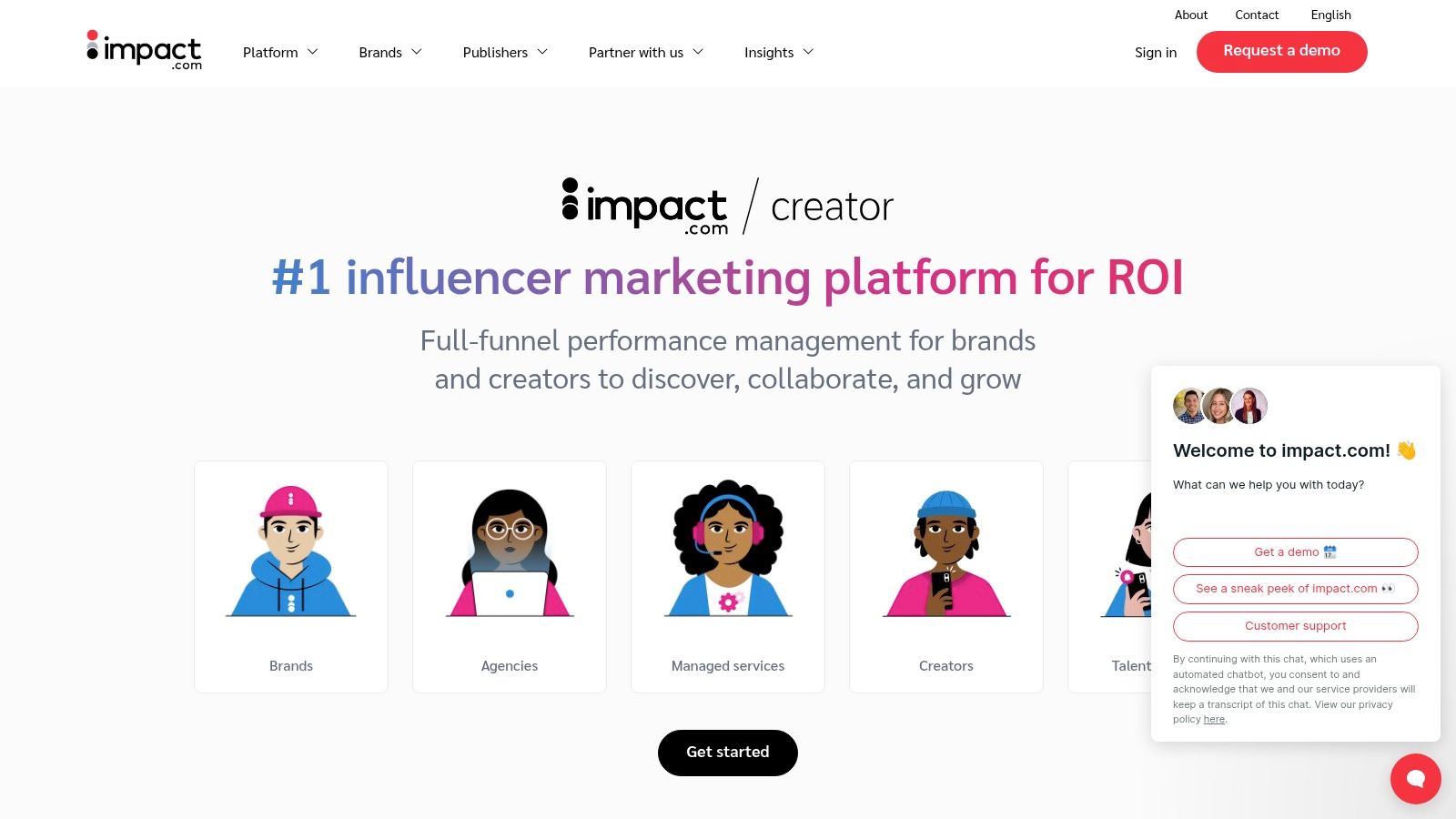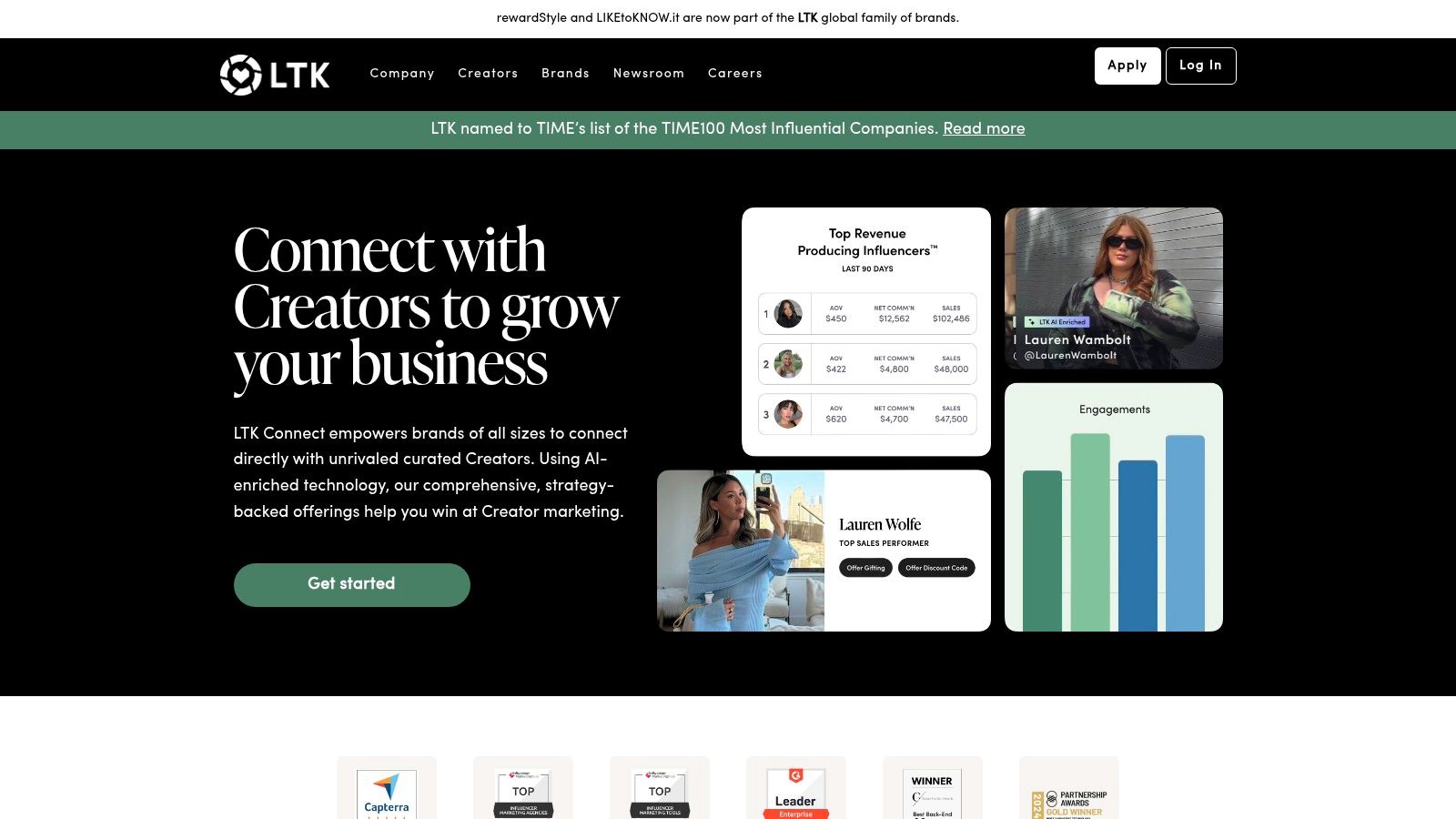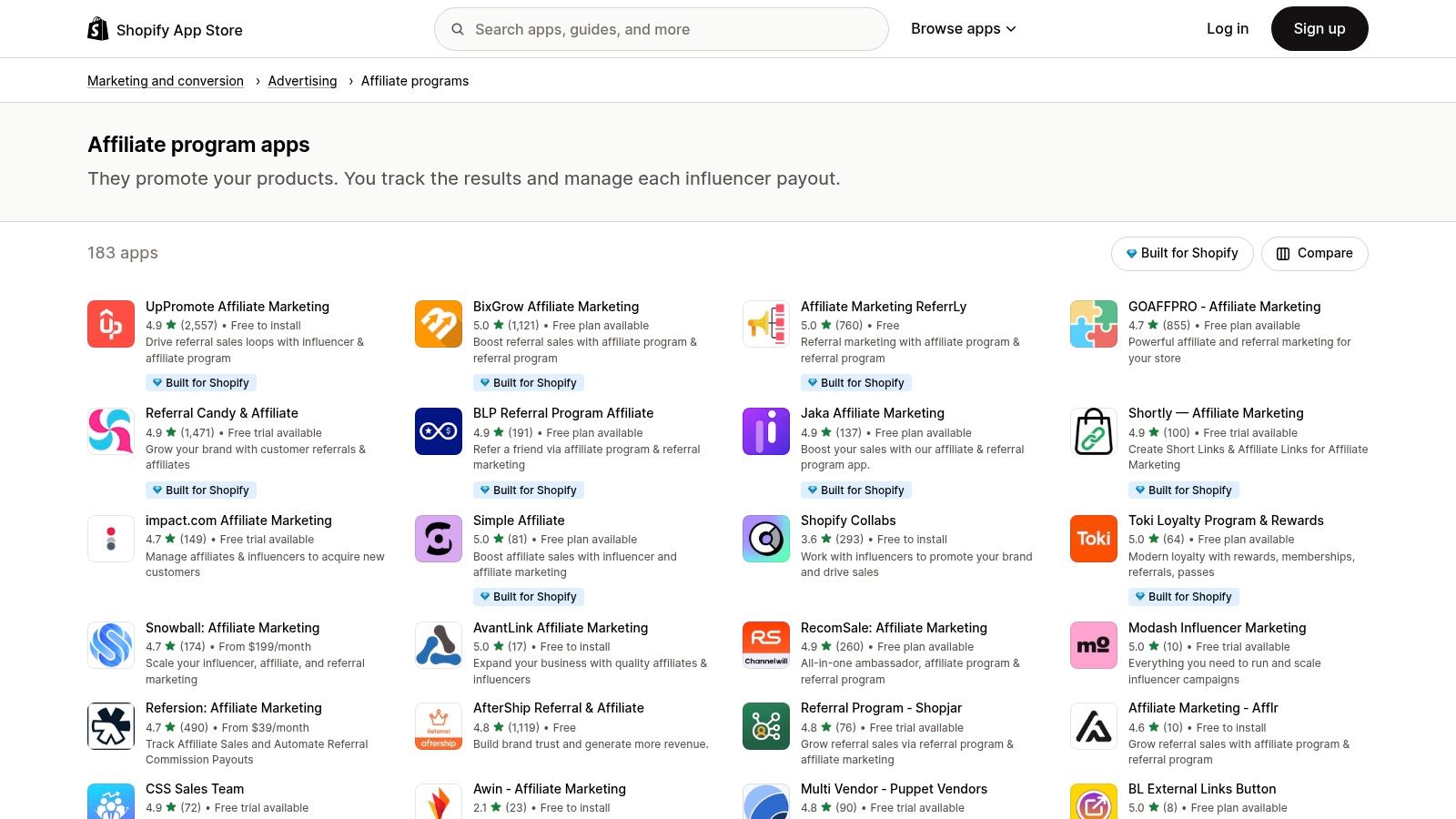In 2025, managing influencer marketing with manual spreadsheets and endless DMs is no longer a viable strategy. The right software does more than just find creators; it streamlines relationship management, tracks campaign performance, automates payments, and, most importantly, proves ROI. However, navigating the crowded market to find the best influencer marketing tools can be a significant challenge for any marketing team.
This guide is designed to cut through the noise and provide clarity. We will break down the top 12 platforms, from comprehensive enterprise suites like CreatorIQ and GRIN to agile tools like Modash perfect for growing brands. For each tool, we provide a detailed analysis of core features, honest limitations, and practical use-case scenarios to match the right solution to your specific needs. As you explore these options, also consider how artificial intelligence is shaping the space. When exploring cutting-edge solutions, consider platforms that leverage artificial intelligence, such as Sprello's platform for ultra-realistic AI influencer UGC videos, to streamline content creation.
Our goal is to help you select the platform that aligns perfectly with your budget, team size, and campaign objectives. Each review includes screenshots and direct links, giving you everything you need to make an informed decision and scale your influencer programs effectively.
1. REACH
REACH solidifies its position as one of the best influencer marketing tools by offering a powerful, all-in-one ecosystem tailored for agencies, brands, and creators. It’s an exceptionally well-rounded platform designed not just for discovery, but for end-to-end campaign management, making it a standout choice for teams seeking efficiency and measurable ROI. The platform moves beyond basic search functions, providing a truly granular approach to identifying the perfect partners.
What truly sets REACH apart is its specialized support for different user types. For agencies, the fully white-labeled reporting and unlimited project management capabilities are a significant advantage, allowing them to scale client services seamlessly. For brands, the platform demystifies the operational side of influencer marketing by integrating contract management, payment processing, and tax compliance directly into the workflow.
Key Features & Use Cases
- Advanced Influencer Discovery: Go beyond follower counts. Use precise filters for niche, audience demographics, location, and engagement rates to find micro-influencers with high-impact, targeted audiences or established macro-influencers for broad-reach campaigns.
- Centralized Campaign Dashboard: Eliminate spreadsheet chaos. Manage outreach, content approvals, and real-time performance tracking from a single, intuitive interface. This is ideal for teams juggling multiple campaigns and creators simultaneously.
- White-Labeled Agency Tools: Agencies can present the platform’s powerful reporting and management features as their own, enhancing client trust and professionalism.
- Integrated Financials: Brands can handle contracts and payments securely within the platform, while creators benefit from guaranteed fast payments and complete financial transparency.
Expert Insight: REACH excels in reducing the administrative friction that often plagues influencer collaborations. Its integrated approach to contracts, payments, and reporting means marketing teams can focus more on creative strategy and less on manual coordination.
Pros & Cons
| Pros | Cons |
|---|---|
| Granular discovery filters for precise matching | Pricing is not public; requires a direct inquiry |
| All-in-one dashboard streamlines workflow | Potential learning curve for new users |
| White-labeling for agencies is a key feature | |
| Built-in contract and payment processing |
Website: https://reach-influencers.com
2. CreatorIQ
CreatorIQ is an enterprise-level influencer marketing cloud designed for large brands that need to manage complex, global campaigns at scale. It centralizes every part of the process, from discovery and vetting to workflows, compliance, and payments, making it a powerful system of record for multi-team and multi-market operations. Its primary distinction lies in its robust security posture and deep, first-party data integrations.
The platform’s AI-assisted discovery tool sifts through creators across all major social networks, while its official TikTok Marketing Partner status provides access to reliable, first-party metrics that are often unavailable elsewhere. For global brands, the CreatorPay feature is a standout, handling compliant payouts to creators in 190 countries and 120 currencies, which significantly simplifies international campaign logistics.
Who is CreatorIQ best for?
CreatorIQ is one of the best influencer marketing tools specifically for enterprise-level organizations with stringent security, compliance, and data requirements. Its ISO/IEC 27001:2022-aligned security practices and deep integrations with other enterprise systems make it a safe choice for risk-averse brands.
-
Pros:
- Deep data and benchmarking trusted by major global brands.
- Robust security and compliance features for enterprise needs.
- Official TikTok partnership provides first-party performance data.
-
Cons:
- Pricing is not public and is geared toward enterprise budgets.
- Can be overly complex for smaller businesses or individual campaigns.
Website: https://www.creatoriq.com
3. GRIN
GRIN is a creator management platform purpose-built for direct-to-consumer (DTC) and eCommerce brands. It centralizes every aspect of a creator program, from discovery and outreach to product seeding, affiliate link generation, and, most importantly, sales attribution. The platform's core strength lies in its deep integration with major eCommerce stacks like Shopify, Magento, and WooCommerce, allowing brands to track influencer-driven revenue with precision.
This tight commerce integration allows GRIN to move beyond vanity metrics and focus on tangible ROI. It equips brands with tools to manage affiliate commissions, discount codes, and content creation workflows all within one system. By unifying these functions, it bridges the gap between creator relationships and real business outcomes, making it one of the best influencer marketing tools for performance-focused teams.
Who is GRIN best for?
GRIN is ideal for eCommerce brands that treat influencer marketing as a primary sales and performance channel. Its feature set is specifically designed to manage and scale creator relationships that directly contribute to revenue, making it perfect for companies that rely on affiliate marketing, product seeding, and user-generated content to drive growth.
-
Pros:
- Deep eCommerce integrations provide clear ROI and sales attribution.
- All-in-one toolset for managing outreach, products, payments, and affiliates.
- Strong focus on authentic, long-term creator relationships over transactional ads.
-
Cons:
- Pricing is not public and requires a quote, suggesting a higher price point.
- Less suited for brands focused purely on top-of-funnel brand awareness campaigns.
Website: https://grin.co
4. Upfluence
Upfluence positions itself as an all-in-one influencer marketing platform with a strong emphasis on e-commerce and affiliate sales tracking. It combines a massive creator database with robust campaign management, a native creator marketplace, and deep integrations, making it a powerful solution for brands focused on driving direct revenue from their influencer partnerships. The platform’s ability to manage everything from discovery to payments and ROI analysis in one place is its core value proposition.
What sets Upfluence apart is its focus on commerce-driven features. It offers native integrations with Shopify, WooCommerce, and Klaviyo, alongside dedicated workflows for Amazon Attribution. This allows brands to seamlessly seed products, generate unique affiliate codes, and track influencer-driven sales from click to conversion. Its social listening tool is also a key differentiator, helping brands identify and recruit their most influential organic fans and customers to turn them into authentic brand ambassadors.
Who is Upfluence best for?
Upfluence is one of the best influencer marketing tools for direct-to-consumer (DTC) brands and e-commerce businesses that prioritize sales and ROI tracking. Its comprehensive suite of tools helps reduce reliance on multiple platforms, streamlining workflows from outreach to final payout. The inclusion of a creator marketplace also provides an inbound channel for finding relevant partners. Learn more about how tools like Upfluence streamline influencer marketing automation.
-
Pros:
- Strong e-commerce and affiliate focus with end-to-end sales tracking.
- Wide range of integrations reduces the need for multiple tools.
- Creator marketplace allows influencers to apply directly to campaigns.
-
Cons:
- Requires a minimum 12-month contract, which is a significant commitment.
- Pricing is not publicly available and requires a custom quote.
Website: https://www.upfluence.com
5. Aspire
Aspire offers a flexible approach to influencer marketing, combining a self-serve software platform with optional agency-run services. It's designed for brands that want control over their campaigns but also value the ability to tap into expert support for strategy and execution when needed. The platform streamlines everything from creator discovery and outreach to content collection and performance analytics, making it a comprehensive solution.
Its standout features include a creator marketplace where influencers can apply to campaigns, and the "Elevate" workflow, which provides helpful payment recommendations to guide fair compensation. For brands looking to scale quickly, add-ons like "Curated Creators Plus" guarantee a certain volume of invites, removing some of the uncertainty from outreach. This hybrid model makes it one of the best influencer marketing tools for growing teams. Learn more about Aspire and other micro-influencer platforms.
Who is Aspire best for?
Aspire is ideal for direct-to-consumer (DTC) brands and agencies that need a scalable platform that can grow with them. Its mix of software and managed services caters to teams that may start with a DIY approach but anticipate needing full campaign management in the future.
-
Pros:
- Flexible model combines self-serve software with optional managed services.
- Helpful add-ons provide tactical support like guaranteed outreach volumes.
- Transparent pricing is available for specific services and add-ons.
-
Cons:
- Core platform pricing requires a demo and is not publicly listed.
- Add-on costs can accumulate as they apply to specific functions.
Website: https://www.aspire.io
6. Traackr
Traackr is a data-rich influencer marketing platform built for enterprise-level brands that prioritize deep analytics, competitive benchmarking, and brand safety. It is particularly well-regarded in the beauty, fashion, and consumer goods sectors, offering sophisticated tools to measure brand performance against competitors and industry benchmarks. The platform provides a full-suite solution, covering everything from creator discovery and vetting to global campaign management and reporting.
Its core strength lies in its ability to transform raw influencer data into actionable strategic insights. Traackr’s Brand Vitality Score (VIT) allows marketers to measure, benchmark, and optimize their influencer program's impact on brand awareness and engagement. This focus on measurement makes it one of the best influencer marketing tools for data-driven teams needing to prove ROI and make informed decisions for complex, multi-market campaigns.
Who is Traackr best for?
Traackr is best for large, global consumer brands, especially in visually driven markets like beauty and fashion, that require robust analytics and competitive intelligence. Its structure is designed for established marketing teams managing long-term, scalable influencer programs with a significant budget.
-
Pros:
- Strong analytics, measurement, and category benchmarking features.
- Clear published starting prices for enterprise tiers, offering transparency.
- Suited to complex, multi-market teams needing a unified system.
-
Cons:
- High annual minimums and multi-user requirements make it inaccessible for smaller businesses.
- Requires annual contracts, making it unsuitable for short-term or test campaigns.
Website: https://www.traackr.com
7. Modash
Modash is an accessible and modern influencer marketing platform built for speed and efficiency, particularly for SMBs and direct-to-consumer brands. It provides a massive database of over 250 million creators and focuses on delivering essential discovery, analytics, and campaign management tools without the enterprise-level complexity or price tag. Its straightforward, transparent pricing and quick onboarding make it an excellent entry point for teams needing to scale their influencer programs quickly.
The platform shines in its core functions: users can quickly find and analyze creator profiles, track campaign content through dashboards, and manage affiliate links or codes. A key differentiator for compliance-minded teams is its ability to automatically monitor for disclosure issues, sending alerts when necessary. The optional affiliate payout feature further streamlines the process, positioning Modash as one of the best influencer marketing tools for teams that prioritize practicality and ease of use.
Who is Modash best for?
Modash is ideal for small to medium-sized businesses, particularly DTC brands in the US market, that need a powerful yet straightforward tool without a steep learning curve. Its practical feature set and clear pricing tiers are designed for teams that are ready to move beyond manual spreadsheets and adopt a more streamlined workflow.
-
Pros:
- Transparent monthly and annual pricing with a free trial available.
- Extremely quick to adopt with minimal onboarding friction.
- Practical usage limits aligned with team size and campaign needs.
-
Cons:
- Fewer advanced features compared to heavyweight enterprise suites.
- Advanced capabilities like data exports are reserved for higher-tier plans.
Website: https://www.modash.io
8. HypeAuditor
HypeAuditor is an AI-powered analytics and discovery platform focused on ensuring influencer authenticity and preventing fraud. It specializes in deep audience analysis, providing detailed quality scores, fake follower detection, and engagement rate verification. This makes it an essential due-diligence tool for brands that prioritize genuine reach and want to avoid investing in influencers with inflated or bot-driven metrics.
The platform’s strength is its proprietary Audience Quality Score (AQS), a single metric from 1 to 100 that assesses an influencer’s follower quality. Beyond just vetting, its discovery tool allows users to filter through a massive database of creators using granular demographic and interest-based criteria. While it also offers campaign management and reporting, its core value remains in its powerful, data-driven vetting capabilities that help marketers make smarter, more secure partnership decisions.
Who is HypeAuditor best for?
HypeAuditor is one of the best influencer marketing tools for marketers and agencies who need to rigorously vet potential partners before committing to a campaign. Its focus on fraud detection and audience quality makes it ideal for brands that need to justify ROI with reliable, transparent data and avoid common influencer marketing pitfalls.
-
Pros:
- Strong anti-fraud and audience authenticity toolkit.
- Useful for multi-market vetting and benchmarking performance.
- Free trial and demo options are available for initial exploration.
-
Cons:
- Pricing is not public and requires contacting sales.
- Advanced features are often gated behind higher-tier plans.
Website: https://hypeauditor.com
9. impact.com
Impact.com is a comprehensive partnership platform that unifies influencer marketing with affiliate programs, offering a single ecosystem to manage diverse creator collaborations. Following its acquisition of ACTIVATE, the platform integrates robust tools for creator discovery, contracting, automated payouts, and full-funnel performance tracking, making it ideal for brands looking to merge their various partnership channels. Its core strength is connecting influencer activity directly to commerce outcomes.
The platform provides access to a marketplace of over 80,000 vetted creators and automates tedious administrative work like contracts, task assignments, and usage rights. For e-commerce brands, its strong Shopify integration and focus on tracking conversions make it one of the best influencer marketing tools for measuring bottom-line results. Brands can also choose between a self-serve model or optional managed services for strategy, casting, and end-to-end campaign execution.
Who is impact.com best for?
Impact.com is particularly effective for e-commerce brands and companies that want to manage their influencer and affiliate marketing programs under one roof. Its full-funnel analytics are excellent for businesses focused on proving the financial return of their campaigns.
-
Pros:
- Strong for merging affiliate and creator marketing efforts.
- Excellent e-commerce and Shopify integrations for performance tracking.
- Flexible service model with both self-serve and managed options.
-
Cons:
- Pricing is not public and often requires a custom quote.
- Can feel complex for small teams or those new to influencer marketing.
Website: https://impact.com/creator
10. LTK Connect
LTK Connect is a self-serve platform designed for brands to tap into LTK’s extensive and highly-curated network of commerce-focused creators. It streamlines the entire collaboration process, from sourcing and casting influencers to managing campaigns, payments, and reporting. The platform's core strength lies in its direct access to a shopping-oriented creator ecosystem, making it ideal for brands prioritizing sales-driven outcomes.
Unlike broad discovery platforms, LTK Connect offers a vetted talent pool known for driving conversions. Its transparent, tiered pricing (Launch, Pro, and Scale) provides a clear path for businesses of all sizes, from SMBs to enterprises. Features like end-to-end campaign management, audience insights, and a Shopify integration further empower brands to execute performance-based partnerships efficiently and measure their direct impact on sales.
Who is LTK Connect best for?
LTK Connect is one of the best influencer marketing tools for e-commerce and direct-to-consumer (DTC) brands that want a straightforward, self-serve solution to connect with vetted, sales-focused influencers. Its clear pricing tiers make it accessible for small-to-medium businesses, while its robust features also cater to larger enterprise needs.
-
Pros:
- Transparent subscription pricing with a clear upgrade path for scaling brands.
- Access to a large, high-quality, and shopping-oriented creator ecosystem.
- Strong focus on commerce with features like Shopify integration.
-
Cons:
- Tiers come with annual budget caps unless upgraded.
- Campaigns perform best with a hybrid model of flat fees plus competitive commissions.
Website: https://company.shopltk.com/connect
11. G2 – Influencer Marketing Platforms category
G2 is not a tool itself, but a comprehensive software marketplace that serves as a crucial research hub for anyone evaluating influencer marketing platforms. It offers an aggregated view of the landscape, complete with verified user reviews, live category grids, and powerful filters to sort solutions by company size, desired features, and pricing models. This makes it an essential first stop for validating vendor claims and understanding real-world user satisfaction before committing to a demo or purchase.
The platform’s strength lies in its "Grid" reports, which map out platforms based on market presence and user satisfaction, providing an at-a-glance market overview. Users can read detailed pros and cons sourced directly from active users, compare up to four platforms side-by-side, and often discover rising stars or niche tools that may have been missed otherwise. For teams building a shortlist, G2 is one of the best influencer marketing tools for due diligence.
Who is G2 – Influencer Marketing Platforms category best for?
G2 is ideal for marketing managers and procurement teams in the initial research and validation phase of selecting a new tool. It helps buyers compare options objectively, gather social proof, and ensure a platform’s advertised features align with actual user experiences.
-
Pros:
- Provides an up-to-date market view that includes emerging tools.
- Useful for validating vendor claims with real-world user feedback.
- Excellent discovery hub to find solutions beyond the biggest names.
-
Cons:
- Reviews can sometimes skew toward specific user segments or company sizes.
- Always verify pricing and feature details directly on the vendor’s website.
Website: https://www.g2.com/categories/influencer-marketing-platforms
12. Shopify App Store – Influencer/Affiliate category
For direct-to-consumer brands built on Shopify, the official App Store’s Influencer/Affiliate category is the most direct path to integrated campaign management. It’s not a single platform but a marketplace of specialized apps, including native tools like Shopify Collabs and third-party solutions from services like impact.com and Modash. This ecosystem allows merchants to find, install, and manage influencer tools directly within their e-commerce admin panel.
The primary advantage is seamless integration, enabling features like one-click discount code generation, product gifting from existing inventory, and commission payouts tied directly to sales data. Transparent pricing, user reviews, and “Built for Shopify” badges help merchants vet and select the right tool for their budget and needs, from simple affiliate link trackers to more comprehensive influencer relationship management systems. This makes it one of the best influencer marketing tools for e-commerce brands prioritizing efficiency.
Who is Shopify App Store – Influencer/Affiliate category best for?
This marketplace is ideal for Shopify-based e-commerce brands, particularly DTC startups and SMBs, that want to manage influencer and affiliate marketing without leaving their native platform. It offers a low-friction way to experiment with various tools and scale up as marketing needs evolve.
-
Pros:
- Fast installation and management directly within the Shopify admin.
- Wide spectrum of pricing, from free plans to enterprise add-ons.
- Merchant reviews provide reliable insights into each app's performance.
-
Cons:
- Many apps are affiliate-first rather than full influencer marketing platforms.
- The depth of discovery and analytics varies significantly between apps.
Website: https://apps.shopify.com/categories/marketing-and-conversion-advertising-affiliate-programs
Top 12 Influencer Marketing Tools Comparison
| Platform | Core Features/Capabilities | User Experience & Quality ★ | Value & Pricing 💰 | Target Audience 👥 | Unique Selling Points ✨ |
|---|---|---|---|---|---|
| REACH 🏆 | Advanced discovery with niche filters; white-labeled campaigns; real-time tracking & analytics | Centralized dashboard; proven ROI tracking | Pricing on inquiry; tailored solutions | Agencies, Brands, Influencers | All-in-one platform; fast payments; unlimited client projects |
| CreatorIQ | AI creator discovery; enterprise integrations; global payouts | Enterprise-grade security & compliance ★★★★☆ | Enterprise pricing; quote-based | Large Brands & Enterprises | TikTok official partner; ISO/IEC aligned security |
| GRIN | Creator CRM; affiliate campaign tooling; commerce integrations | Focused on eCommerce; performance ROI tracking ★★★★☆ | Custom pricing; tiered by program maturity | eCommerce Brands & Affiliates | Structured onboarding; sales attribution focus |
| Upfluence | Multi-platform discovery; CRM & workflows; payment integration | Strong commerce tracking; marketplace available ★★★☆☆ | Quote-based; 12-month min contracts | eCommerce & Affiliate Marketers | AI outreach; Amazon Attribution; broad integrations |
| Aspire | Creator discovery; application marketplace; add-on agency services | Mix of self-serve + managed; transparent add-on pricing | Pricing not public; add-on costs apply | US Agencies & Brands | Managed services; recommended payment guidance |
| Traackr | Discovery & vetting; benchmarking; global reporting | Data-rich analytics; category-specific insights ★★★★☆ | Clear enterprise starting prices; annual | Large, multi-market enterprises | Published pricing; strong brand safety features |
| Modash | Fast discovery; campaign dashboards; affiliate payouts | SMB-friendly pricing; easy onboarding ★★★☆☆ | Transparent monthly/annual pricing; free trial | SMB & US DTC brands | 250M+ creators; affiliate payouts; low friction |
| HypeAuditor | AI-driven authenticity scoring; fraud detection; reporting | Strong anti-fraud tools; reliable vetting ★★★☆☆ | Pricing on inquiry; some gated features | Multi-market vetting & benchmarking | Audience quality focus; fraud detection |
| impact.com | Affiliate + influencer platform; automated payments & contracts | Full funnel analytics & content mgmt ★★★☆☆ | Quote-based; complexity varies by package | Brands merging affiliate + influencer programs | Large vetted marketplace; managed services option |
| LTK Connect | Curated creator network; campaign casting & payments | Transparent tier pricing; commerce-focused ★★★☆☆ | Subscription tiers with budget caps | SMB to Enterprise commerce brands | Shopify integration; large shopping ecosystem |
| G2 – Influencer Marketing Platforms | Platform ranking; verified user reviews & insights | Real user feedback; up-to-date scores ★★★★☆ | Free to use; marketplace for research | Buyers evaluating influencer platforms | Verified reviews; detailed pros/cons |
| Shopify App Store | Native & third-party influencer/affiliate apps | Fast install; built for Shopify merchants ★★★☆☆ | Wide price range from free to enterprise | Shopify Merchants & US DTC brands | Native billing; variety of affiliate-first tools |
Making Your Final Decision: It's About Strategy, Not Just Software
Navigating the crowded landscape of influencer marketing platforms can feel overwhelming. We've explored a wide range of options, from enterprise-level powerhouses like CreatorIQ and Traackr to e-commerce-focused solutions like GRIN and Aspire, and specialized analytics tools such as HypeAuditor and Modash. The key takeaway is clear: the "best influencer marketing tools" are not one-size-fits-all. The ideal platform is the one that aligns perfectly with your specific strategy, budget, and operational workflow.
Your final choice should be a direct reflection of your business needs. An in-house team at a large CPG brand has vastly different requirements than a small D2C startup running its first campaign. Before you sign a contract, return to your core objectives. Are you struggling with discovering authentic creators, managing hundreds of relationships, or tracking conversions from Shopify? Your primary pain point is your starting point.
From Software to Strategy: Your Actionable Next Steps
Making a confident decision requires a structured approach. Instead of getting distracted by flashy features, focus on a methodical evaluation process.
-
Map Your Current Workflow: Before you can fix a problem, you need to understand it. Document every step of your current influencer marketing process, from discovery and outreach to content approval, payment, and reporting. Identify the most significant time sinks and bottlenecks. This map becomes the blueprint for the solution you need.
-
Define Your Must-Haves vs. Nice-to-Haves: Based on your workflow map, create a checklist. Is a robust creator CRM non-negotiable? Do you absolutely need integrated payment processing? Is whitelabeling for agency clients a must? Separate your essential requirements from the features that would be merely convenient. This clarity will help you quickly disqualify platforms that aren't a good fit.
-
Leverage Demos and Trials: Never buy an influencer marketing platform based on a sales pitch alone. Schedule demos with your top 2-3 contenders. Come prepared with specific questions related to your workflow and must-have features. If a free trial is available, use it to run a small, real-world test campaign to assess its usability and effectiveness firsthand.
Beyond the Platform: The Human Element and ROI
Ultimately, even the most advanced software is just a tool. Its effectiveness depends on the strategy guiding it and the relationships you build. These platforms are designed to automate administrative tasks, freeing you up to focus on what truly matters: fostering genuine connections with creators and co-creating content that resonates with your audience.
After exploring various platforms, the ultimate determinant of success is often the measurable return on investment. For a detailed guide on tracking your campaign's financial impact, learn how to measure influencer marketing ROI with proven methods and metrics. This final step ensures your investment in both software and creators delivers tangible business results, turning your influencer program from a cost center into a powerful growth engine.
Ready to see how a streamlined, white-labeled platform can transform your agency's influencer marketing services? REACH is designed specifically for agencies and brands that need a powerful, customizable, and easy-to-use solution for managing campaigns from start to finish. Book a demo of REACH today to discover a smarter way to manage and scale your influencer relationships.

